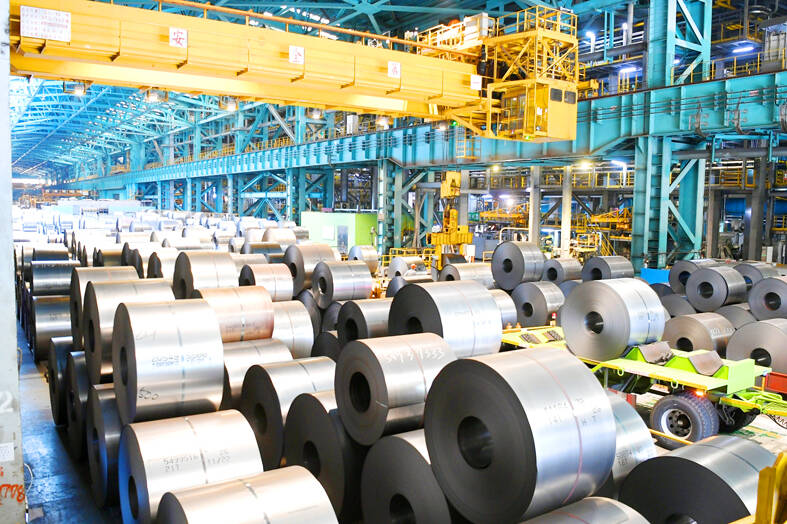China Steel Corp (中鋼), the largest steelmaker in Taiwan, yesterday hiked steel prices extensively by as much as NT$800 per tonne for domestic deliveries next month and next quarter as the global steel industry is emerging from a one-and-a-half-year slump amid an improving global economy.
The Kaohsiung-based steelmaker said the price hikes came on the heels of price upticks by global peers as moderating inflation and a recovering economy boost car demand and steel consumption.
Next year, total car shipments are to expand 4 percent to 90.2 million globally, China Steel said in a statement, citing forecasts by J.D. Power.

Photo courtesy of China Steel Corp
The World Steel Association also raised its forecast for next year’s steel demand to an annual growth of 1.9 percent, representing an increase of 34.60 million tonnes, a clear indicator that the global steel industrial downcycle is approaching its end, it said.
“The global steel industry is experiencing a prolonged downturn lasting one-and-a-half years. As inventory on the supply chain has dropped to a relatively low level, the steel industry is to usher in a growth period in the first quarter of next year in terms of shipments and prices,” China Steel said.
In Asia, Chinese peers Baowu Steel Group Ltd (寶武鋼鐵), the world’s largest steelmaker, and Angang Steel Co (鞍山鋼鐵) increased the prices of all steel products by between 100 and 200 yuan per tonne for deliveries next month, marking the seventh month of price hikes, China Steel said in its statement.
The price hikes have spread to the rest of the Asian markets and heralded a new wave of price hikes, the steelmaker said.
In the US and European markets, steelmakers have raised prices by 64 percent and 12 percent for hot-rolled steel products since October, which would lead to further price hikes beyond this month, it said.
Apart from a pickup in demand, China Steel said it is raising prices to reflect higher raw material and transportation costs. The price of iron ore climbed to as high as US$140 per tonne, hitting the digest level this year. The prices of coking coal advanced to US$340 per tonne due to lower production from China and Australia.
Transportation costs climbed as the Baltic Exchange’s index for shipping vessels transporting dry bulk commodities soared 135 percent to 2500 from the beginning of September, the steelmaker said.
China Steel yesterday accelerated price hikes by between NT$500 and NT$700 per tonne for deliveries next month, with the steepest price hikes were for hot-rolled coils and electro-galvanized steel coils used in building construction.
For the next quarter, steel prices are to rise faster by between NT$500 and NT$800 per tonne.
The prices of steel rods and high-grade steel plates advanced the most.

Taiwan Semiconductor Manufacturing Co (TSMC, 台積電) yesterday said that its investment plan in Arizona is going according to schedule, following a local media report claiming that the company is planning to break ground on its third wafer fab in the US in June. In a statement, TSMC said it does not comment on market speculation, but that its investments in Arizona are proceeding well. TSMC is investing more than US$65 billion in Arizona to build three advanced wafer fabs. The first one has started production using the 4-nanometer (nm) process, while the second one would start mass production using the

‘SILVER LINING’: Although the news caused TSMC to fall on the local market, an analyst said that as tariffs are not set to go into effect until April, there is still time for negotiations US President Donald Trump on Tuesday said that he would likely impose tariffs on semiconductor, automobile and pharmaceutical imports of about 25 percent, with an announcement coming as soon as April 2 in a move that would represent a dramatic widening of the US leader’s trade war. “I probably will tell you that on April 2, but it’ll be in the neighborhood of 25 percent,” Trump told reporters at his Mar-a-Lago club when asked about his plan for auto tariffs. Asked about similar levies on pharmaceutical drugs and semiconductors, the president said that “it’ll be 25 percent and higher, and it’ll

CHIP BOOM: Revenue for the semiconductor industry is set to reach US$1 trillion by 2032, opening up opportunities for the chip pacakging and testing company, it said ASE Technology Holding Co (日月光投控), the world’s largest provider of outsourced semiconductor assembly and test (OSAT) services, yesterday launched a new advanced manufacturing facility in Penang, Malaysia, aiming to meet growing demand for emerging technologies such as generative artificial intelligence (AI) applications. The US$300 million facility is a critical step in expanding ASE’s global footprint, offering an alternative for customers from the US, Europe, Japan, South Korea and China to assemble and test chips outside of Taiwan amid efforts to diversify supply chains. The plant, the company’s fifth in Malaysia, is part of a strategic expansion plan that would more than triple

When an apartment comes up for rent in Germany’s big cities, hundreds of prospective tenants often queue down the street to view it, but the acute shortage of affordable housing is getting scant attention ahead of today’s snap general election. “Housing is one of the main problems for people, but nobody talks about it, nobody takes it seriously,” said Andreas Ibel, president of Build Europe, an association representing housing developers. Migration and the sluggish economy top the list of voters’ concerns, but analysts say housing policy fails to break through as returns on investment take time to register, making the